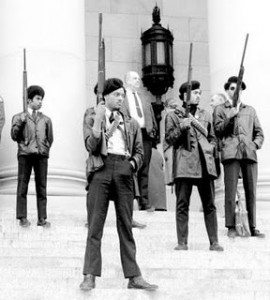Social Justice, Libertarianism
“What are you going to do with your gun?”

Black Panthers at the California Capitol
The most recent issue of The Atlantic has a fascinating article by Adam Winkler on “The Secret History of Guns.” It’s worth reading in its entirety, but I was especially impressed by Winkler’s account of the role played by the Black Panthers in opposing gun control in the late 1960s. The article begins with a brief account of the Panthers’ famous 1967 demonstration at the California state Capitol, where around 30 young black men and women showed up carrying “.357 Magnums, 12-gauge shotguns, and .45 caliber pistols” — loaded.
But an even more striking anecdote involves an encounter between Huey Newton and the Oakland police. Newton had discovered during his time in law school that carrying guns openly in public was legal, and the Panthers began doing so as a matter of course.
In February of 1967, Oakland police officers stopped a car carrying Newton, Seale, and several other Panthers with rifles and handguns. When one officer asked to see one of the guns, Newton refused. “I don’t have to give you anything but my identification, name, and address,” he insisted. This, too, he had learned in law school.
“Who in the hell do you think you are?” an officer responded.
“Who in the hell do you think *you* are?,” Newton replied indignantly. He told the officer that he and his friends had a legal right to have their firearms.
Newton got out of the car, still holding his rifle.
“What are you going to do with that gun?” asked one of the stunned policemen.
“What are you going to do with *your* gun?,” Newton replied.
The altercation continued, drawing a crowd of onlookers. And even after Newton (loudly) informed the officers that “if you try to shoot at me or if you try to take this gun, I’m going to shoot back at you, swine,” the Panthers were allowed to go on their way. Newton was correct – they hadn’t committed any crime.
For the Black Panthers, the right to own and carry weapons was more than just an important civil liberty – it was the guarantor of liberty, the last effective block against tyranny. The gun, they claimed “is the only thing that will free us – gain us our liberation.” On the Capitol steps, Bobby Seale proclaimed that
The American people in general and the black people in particular [must] … take careful note of the racist California legislature aimed at keeping the black people disarmed and powerless. Black people have begged, prayed, petitioned, demonstrated, and everything else to get the racist power structure of America to right the wrongs which have historically been perpetuated against black people. The time has come for black people to arm themselves against this terror before it is too late.
In addition to openly carrying their firearms in public, the Panthers
began a regular practice of policing the police. Thanks to an army of new recruits inspired to join up when they heard about Newton’s bravado, groups of armed Panthers would drive around following police cars. When the police stopped a black person, the Panthers would stand off to the side and shout out legal advice.
For me, this article provides a dramatic illustration of a fundamental theme of bleeding heart libertarianism: the special importance of liberty for oppressed and marginalized groups. Today, we see opposition to gun control as a primarily white, male, Republican issue. But it was exactly that white, male, Republican group that was the most vociferous in supporting gun control when the people carrying the guns were young, black, militant men and women. The suppression of liberty in the case of guns – much like the suppression of liberty in the case of drugs – was largely motivated by racist fears about the abuse of that liberty by the “other.” And even if the suppression of liberty is perfectly general in form, it is almost always the marginalized “other” who suffers most by its loss.
This isn’t to say that the Panthers were right that the gun is the only thing that would win them liberation. I’m far from an expert on the relevant history, but from where I stand Martin Luther King’s nonviolent resistance seems to have had a much greater influence as a political strategy than the Panthers’ more confrontational approach. Still, even if gun ownership was strategically insignificant, it’s worth considering its symbolic importance.
An armed policeman confronting a disarmed civilian is the picture of inequality. In the face of such inequality, citizens can request that the police respect their rights, regardless of the fact that it is clearly in their power not to do so. But by openly carrying firearms, the Panthers did two things: they made vivid the generally peaceful and responsible exercise of liberty by young blacks, in contrast to the daily, terrible abuse of that very same liberty by the police. And, second, they showed that they viewed their rights as something to be demanded as a matter of justice, not requested as a an exercise of charity. That is a sentiment that ought to resonate with libertarians, especially bleeding heart libertarians, more than it currently seems to.
You can read more from Adam Winkler in his book, Gun Fight: The Battle over the Right to Bear Arms in America.

